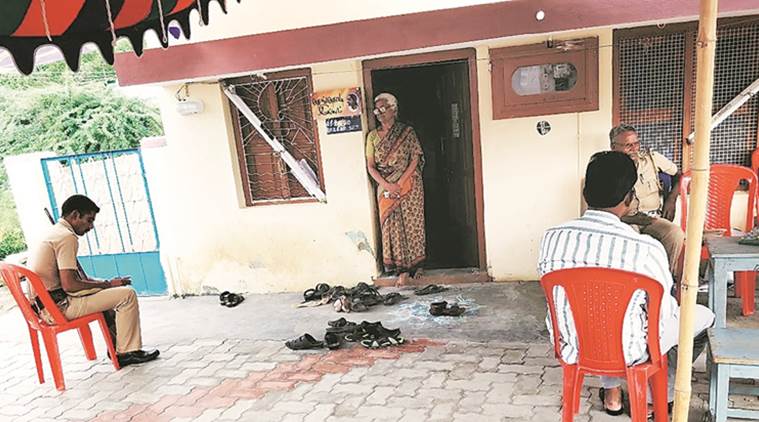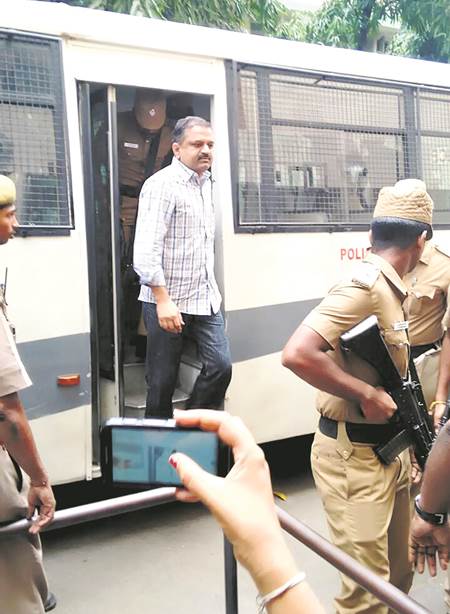Written by Arun Janardhanan |Updated: September 24, 2017 11:12:10 am
What parole, after 27 years of wait, means for Rajiv Gandhi assassination convict A G Perarivalan and his family
 |
| Perarivalan's mother at their home. Policemen sat in the verandah through the parole, keeping a watch on visitors (Arun Janardhanan). |
It was around 7.45 pm on August 24 and he was preparing to go to sleep when the key turned and a jail official entered his cell. “Okay, come out,” the official told A G Perarivalan. “You have got parole.” It took several minutes for the balding, middle-aged convict to register the news, the official recalls. Convicted in the Rajiv Gandhi assassination case, Perarivalan alias Arivu had been arrested in June 1991 at the age of 19. In the 26 years hence, he hadn’t been let out on a single day’s parole or bail. “All he picked up on his way out was a lungi. We suggested he take some extra clothes, apart from the shirt and trousers he was wearing,” says the official. “He replied, ‘Why should I? I am going home’.” When Perarivalan stepped out of Vellore Central Prison around 9 on a humid night, there was no one to receive him. His mother, Arputham Ammal, 66, who has been almost single-handedly fighting for his early release from jail, had said she would believe he was finally coming home when he returned. The announcement of the parole, for Perarivalan to see his ailing father, had come out of the blue.
It is 80 km to their home in Jolarpet, and it took Perarivalan, accompanied by a dozen policemen in two vehicles, 90 minutes to reach. Ammal says she asked him later what he saw along the way. “He did not see anything except a four-lane highway,” she says, her eyes welling up. “When the convoy crossed Ambur and Vaniyambadi, he asked policemen about those towns. But they said they wouldn’t be entering any, just stick to the highway.” At Jolarpet, a full house awaited him, including his parents, his married sisters A G Anbumani (who teaches at Annamalai University) and A G Arulselvi (an engineer with the Rural Development Department), their families, and other relatives and friends. More would keep dropping by all month long. Each registered their names and addresses with the policemen who sat outside the two-room house, in the verandah, keeping a watch.
As per the conditions of his parole, Perarivalan couldn’t give interviews or be photographed, or leave his home. The visitors also had to leave their phones outside. “No selfies,” Ammal says. ‘Selfie’ was a word Perarivalan heard for the first time in jail. It was also in prison that he learnt that Anbumani’s son, whom he saw as a 15-day-old infant in 1992, had become a software engineer. Ammal says the 25-year-old took leave to visit his uncle. “Perarivalan couldn’t stop smiling at the clothes the boy got him.”
The 45-year-old struggled to identify other visitors. Some tried to jog his memory telling him their name, others recounted anecdotes from a shared school trip or an NCC camp. Perarivalan was sentenced to death in May 1999, on the charge of purchasing an 8-volt battery used by the assassins to trigger the belt bomb that killed Rajiv Gandhi. In 2014, his sentence and that of two others, Murugan and Santhan (both Sri Lankans), was commuted to life. Soon after, the Tamil Nadu government ordered the release of all seven convicts in the case, but the Centre went to the Supreme Court to stop this. The matter stands there.
 |
| Perarivalan in 2015, when he was taken to Chennai for treatment. (File) |
Perarivalan continues to plead that he didn’t know about the main conspiracy. Says Ammal, “All these visitors… nobody here believes he is a murderer. Even after all these years in prison, he tells me he is innocent. That is why I am still fighting for him.” Their house hasn’t changed much in these nearly three decades — the family lives on his father’s pension — but the world outside has sped on, even in the village. Perarivalan spent most of his day on the house’s terrace taking it all in. Their home is located on the foothills of the scenic Yelagiri hills, and Perarivalan remarked how what used to be a vacant plot nearby had a concrete house on it now, and that all around were multi-storey structures. “He lamented that his favourite creche teacher, Babyamma, was no more. He couldn’t even spot where her house used to be down the street,” Ammal says.
His biggest source of wonder were the two cellphone towers opposite their house, sheltering dozens of monkeys. In prison, Perarivalan doesn’t have access to TV, except for rare film screenings, but can receive newspapers, occasional visitors, and is allowed one phone call of nine minutes every six days. Perarivalan told friends about a visit to Chennai in 2015, where he was taken for treatment for back pain, urinary problems and hypertension. He then realised a lot had changed — he could identify only two buildings, Ripon Building and the Chennai Central station. He was struck by the roads, the people busy with cellphones, and especially “the children talking like adults”.
But the biggest blow was seeing the change in his father Njanasekharan, who once taught Tamil at the Jolarpet government school, wrote Tamil poems under the pen name Kuyildasan, and was known as a scary drill master. The 75-year-old looks like a frail man in his 90s now, and suffers from hypertension, bronchial asthma, acute diabetes and neurological issues. Njanasekharan says Perarivalan carried him up to the terrace during his days home. There, as the son and father together lay in the sun, on the advice of doctors, Njanasekharan says his heart would break. “Arivu was the school topper, the best NCC cadet, he won many awards. See his fate now,” he says.
Ammal constantly fretted about how their small house would accommodate all the visitors. But she fretted about something even more. “I am too old and was too nervous to prepare a feast for my Arivu when he came home at such short notice. So I made only dosa,” she says. Later, everyone coming along got him delicacies he liked. A group of friends sent over boxes full of fish products and crabs from Chennai. “Fish curry is his favourite, and he hadn’t tasted it after 1991 as Tamil Nadu prisons don’t serve fish,” says a stoic Ammal. Perarivalan told one of the visitors, James Kurian, a senior professor of philosophy at the Madras Christian College, that it would be forgotten smells, like that of fish, that he would carry back to prison. Kurian remembers Perarivalan sniffing appreciatively one day as firewood smoke wafted to the terrace where they sat, from a kitchen nearby.
“He said his senses had started diminishing from years of seeing nothing but walls. He talked about obsessively counting the bricks, estimating the size of the door, the bolts. He remembered exactly the 6×9 feet cell he spent 11 years of his initial prison term in, in solitary confinement.” The worst years though have been the last three years, Kurian adds, after Perarivalan’s death sentence was commuted to life. With hopes of a release rising, he has been fighting anxiety. Perarivalan jokes that this is why he has lost his hair. Murugan and Santhan, the other two convicts whose death sentence was commuted, are reportedly suffering from depression. Recently, Murugan sought mercy killing.
Perarivalan fears some changes in him may be irreparable. Kurian says having lived alone all these years, he gets anxious amidst crowds now. Children and their frankness trouble him even more, and he couldn’t believe how much his sister Arulselvi’s daughters wanted to see him. Among the visitors was another child, the nine-year-old son of a schoolmate. Perarivalan was very embarrassed as he couldn’t place the friend. To lessen the embarrassment, he asked the boy his name. When the boy said ‘Perarivalan’, he was stunned. Ammal, crying every such time, finally sought relief in musician Ilayaraja. When he was a young boy, Perarivalan would sing Ilayaraja songs with his mother. Some friends who have been helping Ammal in Perarivalan’s case, including aspiring filmmakers and cinematographers, brought along a keyboard, and the mother and son sang together again.
The first song Perarivalan sang was Ponna Pola Aatha, about “a mother pure as gold” giving birth, and getting “only sorrow in return”. Ammal now lives on fresh hope. Plucking jasmine flowers to make a garland for Arulselvi’s daughter, she says, “I met CM Edappadi K Palaniswami. He asked me why I had wasted a day to come see him when my son was home. I said I just wanted to thank him, and prayed to him to let Arivu go. He said hopefully soon, if the Centre permits.” Kurian says this time the promise must be kept. He repeats Perarivalan’s words — “Even if the entire world is brought into a cell, it is still a prison.”
 |
| Arputhammal, mother of A.G. Perarivalan. Photo: S. Vijay Kumar |
Ammal recalls others. “A friend from Sathyamangalam got for him three country chickens to eat. We cooked one. Arivu joked ‘one among them was sentenced to death, and two others were commuted to life and later pardoned’. Now they roam around the house freely.”
Source: https://indianexpress.com/article/india/a-g-perarivalan-rajiv-gandhi-assassination-convict-4858177/ (Accessed 23 December 2018)
